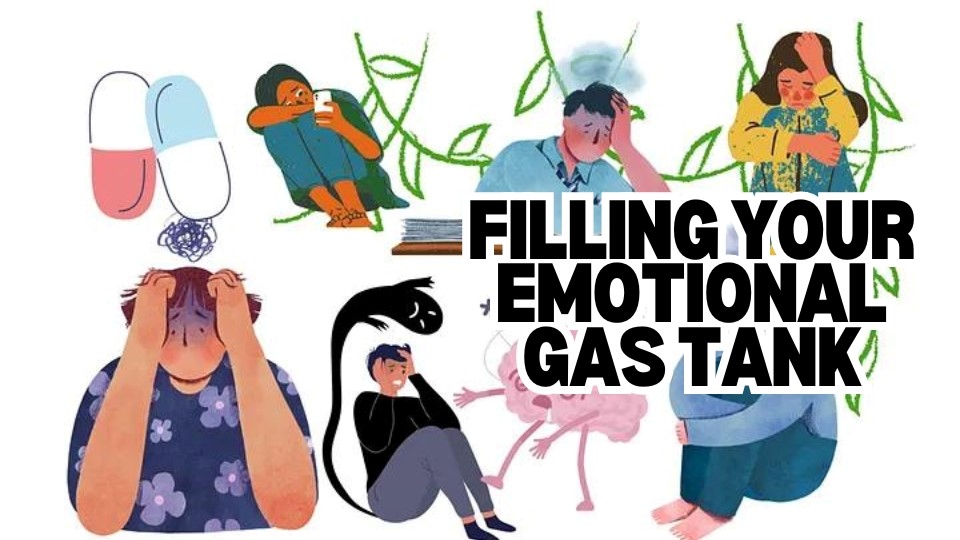Filling your emotional gas tank is essential for maintaining a healthy and balanced life. Just like a car can’t run on empty, we can’t function well if we don’t take time to recharge emotionally. Taking care of our emotional well-being involves recognizing our needs, practicing self-care, and seeking support when necessary.
To keep your emotional tank full, it’s important to set boundaries, say no when you’re overwhelmed, and make time for activities that bring you joy. This could include spending time with loved ones, engaging in hobbies, or simply taking a moment to relax. Being mindful of your mental and emotional state helps prevent burnout and keeps you feeling grounded.
Lastly, nurturing relationships that fuel you is key. Surround yourself with people who uplift and support you rather than drain your energy. Positive connections not only boost your mood but also provide a source of encouragement when you’re feeling low. By regularly filling your emotional gas tank, you’ll be better equipped to handle life’s challenges and stay resilient.
What is an Emotional Gas Tank?
So, what exactly is this emotional gas tank? It’s a simple way for me to understand my mental health. Just like my car needs fuel to operate, I need emotional energy to function well.
| Emotional Gas Tank | Description |
| Full | Feeling energized and ready to take on challenges |
| Empty | Feeling drained, overwhelmed, or unable to cope |
When my tank is full, I feel good and can cope with stress effectively. An empty tank leads to burnout and stress. This metaphor helps me visualize how important it is to check in with myself regularly.

Understanding the Emotional Gas Tank
Filling Your Emotional Gas Tank metaphor really resonates with me. It illustrates how our emotions work like fuel. A full tank means I can handle stress better and enjoy life more. Just like I wouldn’t drive a car on an empty tank, I shouldn’t push myself emotionally without taking time to recharge.
Importance of Balance in Emotional Energy
Balance is key Too much stress without replenishment can cause depletion. Working in a vacuum all the time makes me irritated and less effective in my day-to-day work. Knowing when my emotional state is running low helps me take proactive steps to recharge.
Why is Emotional Well-Being Important?
Maintaining my emotional health is crucial for several reasons:
| Importance of Emotional Well-Being | Impact |
| Physical Health | Poor mental health can lead to physical issues like heart disease and obesity. |
| Relationships | Feeling good emotionally helps me connect better with others. |
| Productivity | When I’m emotionally healthy, I’m more productive at work. |
Impact on Physical Health
Did you know that studies show a strong link between mental health and physical health? According to the CDC, people with poor mental health are at higher risk for chronic diseases. That’s why keeping my Filling Your Emotional Gas Tankfull is not just about feeling good; it’s about staying healthy overall.
Effects on Relationships
When I’m feeling good emotionally, I connect better with friends and family. On the flip side, when my tank is low, I might snap at loved ones or withdraw from social activities. Healthy relationships are crucial for our well-being! Studies have shown that strong social connections can increase longevity by up to 50%—that’s pretty significant!
Boosting Productivity
Let’s face it—when we feel good emotionally, we’re more productive at work or school. Research shows that happy employees are up to 20% more productive than their unhappy counterparts! Keeping my emotional gas tank full gives me the energy and focus to tackle tasks efficiently.
Signs Your Emotional Gas Tank is Low
Identifying symptoms of emotional depletion helps me take action:
Common Indicators
Here are some signs that my emotional gas tank might be running low:
- Fatigue: This means that he feels tired even after a good night’s sleep.
- Top of Form
- Irritability: Getting easily frustrated over small things.
- Lack of Motivation: Struggling to find the energy or desire to do things I usually enjoy.
- Feeling Disconnected: A sense of isolation or disconnection from friends and family.

Long-Term Consequences if Not Addressed
Ignoring these signs can lead to serious mental health issues like anxiety or depression. If I don’t take steps to refill my tank, I risk experiencing burnout or even physical health problems.
Strategies to Refill Filling Your Emotional Gas Tank
Here are some practical methods for emotional replenishment that work for me:
Engaging in Self-Care Activities
Taking time for myself isn’t selfish; it’s necessary! Self-care can be anything from reading a book to taking a long bath or enjoying a favorite hobby.
| Self-Care Activities | Description |
| Reading | Escaping into a good book helps me relax and unwind. |
| Taking a Bath | A warm bath can be incredibly soothing after a long day. |
| Hobbies | Whether it’s painting or gardening, pursuing what I love fills my tank quickly. |
The Importance of Hobbies and Interests
Engaging in activities that bring joy can significantly boost my mood. Whether it’s painting, cooking, or gardening, hobbies allow me to express myself and recharge emotionally. They serve as an outlet for creativity and provide a break from daily stressors.
The Role of Social Connections
Relationships play a big part in my emotional well-being:
Building a Supportive Network
Surrounding myself with positive people boosts my mood. Having friends who understand what I’m going through makes all the difference when times get tough.
Benefits of Socializing and Community Involvement
Engaging with others helps reduce feelings of isolation and loneliness. Whether it’s joining a club or volunteering in the community, social connections enhance our overall well-being.
The Science Behind Social Connections
Research indicates that strong social ties can improve mental health outcomes significantly. A study published in the journal Psychological Science found that people with strong social networks reported higher levels of happiness and lower levels of stress.

Mindfulness and Emotional Health
Mindfulness techniques are powerful tools for replenishment:
Techniques for Practicing Mindfulness
| Mindfulness Techniques | Benefits |
| Deep Breathing | Helps center my thoughts and reduce anxiety. |
| Meditation | Enhances focus and promotes inner peace. |
| Journaling | Writing down thoughts allows me to process emotions better. |
Benefits for Mental Clarity and Peace
Practicing mindfulness not only reduces stress but also enhances mental clarity. By focusing on the present moment, I find peace amid chaos. Mindfulness also encourages self-awareness, helping me recognize when my emotional gas tank is running low.
Physical Activity and Its Impact
Exercise has incredible benefits for my mood:
Types of Exercises That Boost Mood
| Type of Exercise | Benefits |
| Walking | A simple walk can lift my spirits significantly! |
| Dancing | Moving to music releases endorphins—my favorite mood booster! |
| Yoga | Helps me relax while also improving flexibility and strength. |
Recommendations for Incorporating Movement into Daily Life
I aim for at least 30 minutes of activity most days—this could even be a brisk walk during lunch! Finding fun ways to move keeps exercise enjoyable rather than a chore.
The Connection Between Exercise and Mental Health
According to Harvard Health, regular physical activity can help reduce symptoms of anxiety and depression by releasing feel-good chemicals called endorphins.
Nutrition’s Role in Emotional Well-Being
What I eat affects how I feel:
Foods That Promote Mental Health
| Food Category | Benefits |
| Fruits & Vegetables | Packed with vitamins that boost mood; think bananas and blueberries! |
| Omega-3 Fatty Acids | Found in fish; great for brain health—salmon is a favorite! |
| Whole Grains | Foods like brown rice provide sustained energy levels throughout the day. |
Importance of Hydration
Staying hydrated is key; even mild dehydration can impact your mood negatively. Drinking enough water helps keep both mind and body functioning optimally.
The Link Between Nutrition and Mood
Research indicates that diet plays a significant role in mental health outcomes. A study published in Nutritional Neuroscience found that diets rich in fruits, vegetables, whole grains, fish, and healthy fats were associated with lower rates of depression.
Setting Boundaries for Emotional Health
Personal boundaries are essential for maintaining energy:
Recognizing When to Say No
It’s okay for me to decline invitations or requests that drain me. Setting limits ensures I have enough energy for what truly matters—like spending quality time with loved ones or pursuing personal interests.
Benefits of Protecting Your Energy
By protecting my energy through boundaries, I create space for activities that genuinely uplift me rather than deplete me.
How Boundaries Improve Relationships
Setting boundaries doesn’t just protect my energy; it also improves relationships by fostering respect and understanding between myself and others.
Seeking Professional Help
Sometimes I need extra support:
Signs That Professional Support May Be Needed
Filling Your Emotional Gas Tank If feelings of sadness persist or interfere with daily life, it might be time for me to talk to someone—a therapist or counselor can provide valuable guidance.
Types of Therapies Available
| Therapy Type | Description |
| Cognitive Behavioral Therapy | Focuses on changing negative thought patterns into positive ones. |
| Talk Therapy | Provides a safe space to discuss feelings openly with a professional. |
| Group Therapy | Offers support from peers facing similar challenges; sometimes knowing I’m not alone makes all the difference! |
The Importance of Therapy in Mental Health Recovery
Therapy can be incredibly beneficial for those experiencing emotional depletion or mental health challenges. According to the American Psychological Association (APA), therapy can help individuals develop coping mechanisms, improve relationships, and enhance overall well-being.
Also Read: Inside-Out Bucknell Mental Health PSA
FAQs
What does it mean to have an empty emotional gas tank?
An empty Filling Your Emotional Gas Tank means feeling drained, overwhelmed, or unable to cope with daily challenges.
How can I tell if I need to refill my emotional gas tank?
Signs include persistent fatigue, irritability, lack of motivation, and feeling disconnected from others.
What are some quick ways to boost my emotional energy?
Quick boosts can include taking a walk, practicing deep breathing exercises, or reaching out to a friend for support.
Conclusion
Keeping my Filling Your Emotional Gas Tank is key for overall well-being.Understanding and monitoring my emotional state helps me stay on track.Practical strategies for replenishing emotional energy are essential.Prioritizing my emotional health regularly makes all the difference!






